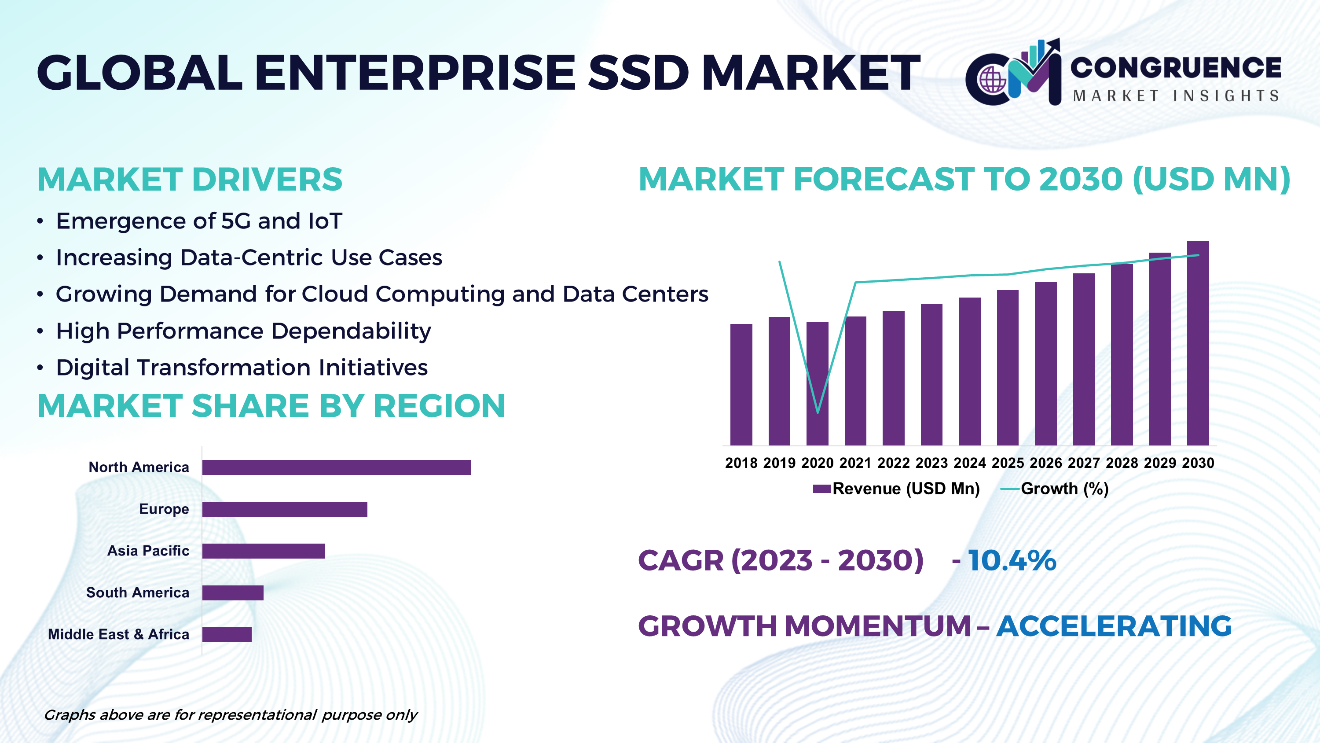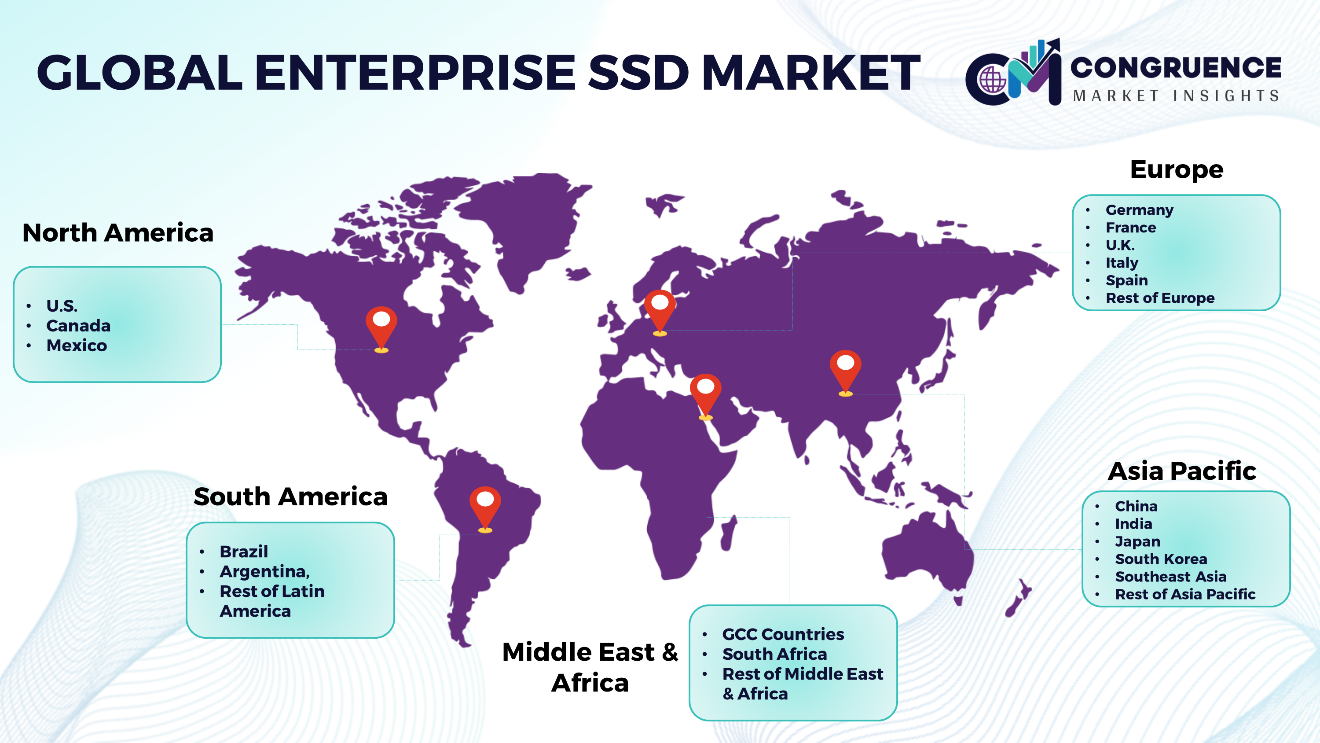Reports
The Global Enterprise SSD Market is expected to expand at a CAGR of 10.4% between 2023 and 2030. The evolution of enterprise SSD technology has significantly enhanced storage performance and reliability. As the utilization of enterprise SSDs expands across diverse sectors including data centers, cloud computing, and high-performance computing, their indispensability grows for efficient data management. These SSDs incorporate crucial components such as NAND flash memory, controllers, and interfaces, ensuring expedited data access and transfer rates. Furthermore, the integration of 5G and IoT technologies has heightened demand for enterprise SSDs, offering augmented storage capabilities to accommodate the substantial data influx from interconnected devices. Within the competitive market landscape, leading industry players continually innovate to address the evolving storage requirements of contemporary enterprises.

Enterprise SSD Market Major Driving Forces
Emergence of 5G and IoT: The deployment of 5G networks and the burgeoning proliferation of IoT devices engender substantial data volumes necessitating real-time processing, storage, and analysis. Enterprise SSDs, endowed with performance, reliability, and minimal latency, are instrumental in efficiently managing these data-intensive workloads, thereby enabling organizations to harness the full potential of 5G and IoT technologies to engender innovation and spawn new business prospects.
Increasing Data-Centric Use Cases: The proliferation of data-centric applications such as big data analytics, AI, ML, and real-time data processing instigates a demand for storage solutions adept at efficiently managing copious data volumes. Enterprise SSDs excel in these domains by furnishing swift and responsive storage performance, thereby empowering organizations to extract actionable insights from their data in a timely manner.
Growing Demand for Cloud Computing and Data Centers: The persistent expansion of cloud computing services and the rapid proliferation of data center infrastructure propel the requisition for high-performance storage solutions. Enterprise SSDs are optimally suited for such environments due to their capacity to furnish consistent performance, scalability, and reliability, thereby underpinning the storage imperatives of cloud-based applications and services.
High Performance Dependability: Enterprise SSDs offer not only expedited data access and transfer rates but also markedly reduced latency in comparison to traditional HDDs. This heightened performance is particularly paramount for data-intensive applications such as databases, virtualization, and real-time analytics, where expeditious data retrieval directly impacts operational efficiency and decision-making processes.
Digital Transformation Initiatives: Enterprises are progressively embracing digital transformation initiatives to modernize their operations, fortify agility, and sustain competitiveness in the contemporary digital landscape. Enterprise SSDs play a pivotal role in facilitating these endeavors by provisioning the high-speed storage infrastructure requisite for facilitating real-time data access, processing, and analysis, thereby fostering innovation and efficiency across diverse industry verticals.
Enterprise SSD Market Key Opportunities
Cloud Infrastructure Growth: The ongoing proliferation of cloud computing services signifies a substantial opportunity for enterprise SSD vendors to furnish storage solutions tailored for cloud environments. In response to cloud service providers' pursuit of delivering swifter and more responsive services, there arises an increasing demand for SSDs capable of supporting the heightened I/O demands inherent in cloud workloads.
Integration with IoT and 5G Infrastructure: The assimilation of SSDs into IoT devices and 5G infrastructure furnishes fresh opportunities for enterprise SSD vendors to address the storage requisites of nascent technologies. SSDs can expedite data processing and analytics in IoT devices, while concurrently supporting the high-speed data transfer prerequisites of 5G networks, thus unveiling novel use cases and applications for SSDs in IoT and telecommunications.
Data Security and Regulatory Compliance: Amid mounting apprehensions regarding data security and privacy, there arises a burgeoning demand for SSDs that offer augmented security features including hardware-based encryption and secure erase functionalities. Enterprise SSD vendors are afforded the opportunity to distinguish their products by furnishing robust security features aligning with the stringent requisites of regulated industries such as healthcare, finance, and government.
Emergence of Edge Computing: The ascendancy of edge computing, entailing the processing of data in close proximity to its source, affords an opportunity for enterprise SSDs to be deployed within edge computing apparatus and appliances. These SSDs can facilitate expedited data processing and analysis at the edge, thereby augmenting the performance and efficacy of edge computing applications across various industries such as manufacturing, healthcare, and retail.
Enterprise SSD Market Key Trends
· Industry standardizing on NVMe for superior performance and reduced latency in enterprise SSDs.
· QLC NAND technology enabling higher storage densities and lower cost per gigabyte in enterprise SSDs.
· SCM blurring lines between volatile memory and SSDs, offering lower latency and higher endurance for high-performance applications.
· Development of energy-efficient SSDs with lower power consumption and higher storage densities to optimize data center infrastructure.
· Integration of compute capabilities into storage devices to offload processing tasks from the CPU and accelerate data analytics workflows.
· Development of SSDs optimized for multi-cloud environments, offering compatibility with various cloud platforms and seamless data migration capabilities.
· Integration of advanced encryption, authentication, and data integrity features into SSDs to ensure data confidentiality and integrity.
· Focus on developing eco-friendly SSDs with reduced power consumption, recyclable materials, and longer product lifecycles to meet sustainability goals.

Market Competition Landscape
The enterprise SSD market exhibits intense competition characterized by ongoing innovation and technological advancements. Key factors driving competition include performance, reliability, cost-effectiveness, and integration with emerging technologies such as NVMe and QLC NAND. Market players vie for market share through product differentiation, strategic partnerships, and targeted marketing efforts aimed at addressing evolving customer needs and preferences.
Key players in the global Enterprise SSD market implement various organic and inorganic strategies to strengthen and improve their market positioning. Prominent players in the market include:
· Samsung
· Intel Corporation
· Micron Technology, Inc.
· Western Digital Corporation
· SK hynix INC.
· Toshiba Electronic Devices & Storage Corporation
· KIOXIA Singapore Pte. Ltd.
· Kingston Technology Europe Co LLP
· ADATA Technology Co., Ltd.
· CORSAIR
· Transcend Information, Inc.
· LITE-ON Technology Corporation
· Patriot Memory, Inc.
· PNY Technologies Inc.
· Silicon Power Computer & Communications Inc.
· Super Talent Technology Corporation
· Prime ABGB Pvt. Ltd.
|
Report Attribute/Metric |
Details |
|
Base Year |
2022 |
|
Forecast Period |
2023 – 2030 |
|
Historical Data |
2018 to 2022 |
|
Forecast Unit |
Value (US$ Mn) |
|
Key Report Deliverable |
Revenue Forecast, Growth Trends, Market Dynamics, Segmental Overview, Regional and Country-wise Analysis, Competition Landscape |
|
Segments Covered |
· By Technology (Single-Level Cell (SLC) SSD, Multi-Level Cell (MLC) SSD, Triple-Level Cell (TLC) SSD, Quad-Level Cell (QLC) SSD, and Others) · By Protocol/Interface Type (Serial Attached SCSI (SAS), Serial ATA (SATA), Peripheral Component Interconnect Express (PCIe), and Non-Volatile Memory Express (NVMe)) · By Storage Capacity (Upto 1 TB, 1TB to 2TB, More than 2TB) · By Application (Data Centers, Enterprise Storage Systems, High-Performance Computing (HPC), Server, Cloud Computing, and Others) · By End Use (BFSI, IT and Telecom, Healthcare, Government and Defense, Media and Entertainment, and Others) |
|
Geographies Covered |
North America: U.S., Canada and Mexico Europe: Germany, France, U.K., Italy, Spain, and Rest of Europe Asia Pacific: China, India, Japan, South Korea, Southeast Asia, and Rest of Asia Pacific South America: Brazil, Argentina, and Rest of Latin America Middle East & Africa: GCC Countries, South Africa, and Rest of Middle East & Africa |
|
Key Players Analyzed |
Samsung, Intel Corporation, Micron Technology, Inc., Western Digital Corporation, SK hynix INC., Toshiba Electronic Devices & Storage Corporation, KIOXIA Singapore Pte. Ltd., Kingston Technology Europe Co LLP, ADATA Technology Co., Ltd., CORSAIR, Transcend Information, Inc., LITE-ON Technology Corporation, Patriot Memory, Inc., PNY Technologies Inc., Silicon Power Computer & Communications Inc., Super Talent Technology Corporation, and Prime ABGB Pvt. Ltd. |
|
Customization & Pricing |
Available on Request (10% Customization is Free) |
